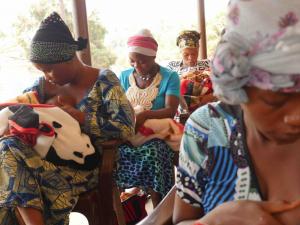Supporting breastfeeding to boost child survival
FREETOWN, December 4 2017 --- This November, Sierra Leone’s Directorate of Food and Nutrition with support from WHO and UKAid organised a five-day training for hospital staff on the Baby-Friendly Hospital Initiative (BFHI), which is an initiative pioneered by WHO and UNICEF to help maternity facilities become trusted centres of breastfeeding and mother/baby bonding support.
Breastfeeding is one of the most critical interventions to improve baby and child health but currently in Sierra Leone, only a third of women practice it exclusively (as recommended by WHO) for the first six months of a child’s life. 1 in 5 infants are given prelacteal feed prior to breastfeeding, which can include water, herbs, formula and other substances.
“Everywhere in the world, breastfeeding is one of the most crucial interventions to ensure babies and children survive and thrive,” said Hannah Yankson, Nutrition Specialist at WHO. “This programme aims to ensure that health workers within our hospitals in Sierra Leone have the required skills and knowledge to pass on sound advice and guidance on this important topic, so that mothers feel empowered to give their babies the best possible start in life.”
Rolling out trainings to support breastfeeding among new mothers
In this first round of trainings, 17 ‘Master Trainers’ were trained and will subsequently cascade the training to more health workers and partners in facilities across the country. The trainers were drawn from a range of relevant backgrounds and departments including staff from the three regional hospitals and the University Teaching Hospital, paediatricians, nutritionists, and midwives; officials from the Food and Nutrition Directorate and others.
Overall, the training aimed to familiarize participants with the BFHI programme, and the 10 steps to successful breastfeeding promoted by WHO and UNICEF. Practical sessions also focused on building effective communication skills to support women in breastfeeding, while promoting good positioning at the breast to improve comfort for the mother.
Next steps for the roll-out of BFHI in Sierra Leone include:
- Finalizing national, hospital and community-level BFHI action plans, developed during the training sessions with realistic timelines for implementation.
- Supporting the University Teaching Hospital ato set up a BFHI committee.
- Conducting cascade BFHI training in the hospitals.
- Advocacy and sensitization of decision makers on BFHI.
- Establishment of BFHI in district hospitals
WHO recommends exclusive breastfeeding for the first six months of a child’s life, and then continued complementary breastfeeding until the child is at least two years old. Introduction of other foods and liquids within the first six months can negatively impact a child’s health status for years to come, increase vulnerability to some common childhood illnesses, and jeopardize survival.
The Ten Steps to Successful Breastfeeding
According to WHO/UNICEF's recommended 10 steps of the BFHI, any facility providing maternity services and care for newborn infants should:
1 Have a written breastfeeding policy that is routinely communicated to all health care staff.
2 Train all health care staff in skills necessary to implement this policy.
3 Inform all pregnant women about the benefits and management of breastfeeding.
4 Help mothers initiate breastfeeding within half an hour of birth.
5 Show mothers how to breastfeed, and how to maintain lactation even if they should be separated from their infants.
6 Give newborn infants no food or drink other than breast milk, unless medically indicated.
7 Practise rooming-in - that is, allow mothers and infants to remain together - 24 hours a day.
8 Encourage breastfeeding on demand.
9 Give no artificial teats or pacifiers (also called dummies or soothers) to breastfeeding infants.
10 Foster the establishment of breastfeeding support groups and refer mothers to them on discharge from the hospital or clinic.
The training process was facilitated with technical support from Dr. Ferima Coulibaly from IST/WA, and Mr Malang Fofana, Programme Manager, National Nutrition Agency (NaNA), Banjul, the Gambia.
